H'rumphs

NATIONAL GUARD TROOPS appearing on the streets of Washington, D.C., last summer was a bit of a surprise. At first, I thought they might have been soldiers left over from Donald Trump’s birthday parade who had wandered off into the city—attracted by the beauty and relative safety of our town—and then missed their ride home. Or maybe the president needed seat fillers for this year’s Kennedy Center Honors of B-List Has-Beens. (At press time, tickets were still available.)
But no, D.C., like L.A. in June, was just a test run for National Guard troops as political intimidation, since aimed at Memphis, Portland, Ore., and Chicago.

A COUPLE OF years ago, my son and I were in Iceland walking through the Fljótsdalshreppur valley toward the Hengifoss waterfall. Roughly halfway through our walk, I had a welcome distraction from wondering how to pronounce Fljótsdalshreppur when we came upon a fence with a closed gate. A sign in English and Icelandic said, “Please close the gate so the sheep won’t escape.”
We’d passed several sheep prior to reaching the gate, and a quick look ahead revealed several clusters of sheep beyond the gate. A new mental exercise: Which sheep were the escapees?
While the number of sheep in Iceland has decreased steadily since 1980—my son and I are only partially responsible for the decline, having spent seven days steadily consuming pylsur, or Icelandic hot dogs, featuring lamb as a main ingredient—there are still nearly one sheep per person. You would think a country with this human-to-sheep ratio would excel at containing sheep. Nope.
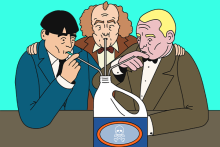
IT’S BEEN ALMOST a hundred years since God created The Three Stooges, who taught us the first rule of humor: If you can’t make people laugh with a joke, then hit each other over the head with a mallet. According to their cinematic archive, no job was too challenging to fail at spectacularly, including plumber, painter, carpenter, chef, and even surgeon. They could not succeed in these endeavors because they were utterly unqualified, a can’t-do attitude that fits right in with today’s Trump administration. But the good news is, any moment now we should start laughing.
In fact, had Moe, Curly, and Larry lived into their second century, they might have been chosen as members of Robert F. Kennedy Jr.’s new Advisory Committee on Immunization Practices, ACIP for short. Since so many of RFK Jr.’s new hires have been sorely mistaken as respected experts in the field of immunology, why not The Three Stooges, whose disqualifying ineptitude could stand shoulder to shoulder with their own.
The original members of ACIP were summarily dismissed for — as far as we can tell — a strong commitment to scientific inquiry and making fact-based decisions. Also, their surprising aversion to prescribing Vitamin A as a wonder cure. (RFK Jr. is a huge vitamin A fan. He can’t get enough of it. Nor, apparently, can he get enough time in tanning beds despite the proven risk of melanoma. To his credit, RFK Jr. will put up looking tanned and fit against a cancer risk any day.)

SHORTLY AFTER THE Vatican announced that Cardinal Robert Francis Prevost, a Chicago native, would be the next pope, the Cubs changed the iconic Wrigley Field sign to read, “Hey, Chicago, He’s a Cubs fan!” Then Pope Leo’s brother John refuted the claim. Apparently, Leo loves the White Sox, which is convenient, given that their colors more closely match the papal vestments. While this revelation is a big loss for the Cubs (they’re used to that, fortunately), it’s still a huge win for the city of Chicago. In June, Chicagoans (even Cubs fans!) swarmed to the White Sox’ Rate Field to hear Pope Leo address his hometown’s faithful via Jumbotron in what Chicago Cardinal Blase J. Cupich called “the sermon on the mound.”
Clearly, the new pope’s love of the Windy City runs deep, so we’ve put together a list of hometown facts about Pope Leo (Chicago Man) XIV. While all unverified by the Vatican, some truth could be hidden here. Stranger things have happened: a man on the moon, an American in the popemobile.

IT WAS OUR first day at the beach, one of the first without our daughters, who were busy with their own adult lives. So I only lugged my own beach chair and bag, not the supplies the girls could never help bring from the car because they were on their cellphones.
The day was gorgeous. The water was perfect for swimming and surfing, the ideal backdrop for a man with no intention of doing either. I was there to sit under a large umbrella, my body glistening with a thick layer of sunscreen for the rare moments when I trudged to the restroom. My only goal: Read a trash novel I would never in good conscience allow in the home. (“Jake Stryker was the best investigator in the FBI. But now, he was the hunted one.”) I sat in a boneless slouch, at one with my canvas chair, a disturbing, vaguely human form.
My blissful reverie was interrupted by a familiar voice next to me.
She: You have a shelf.
Me: What?

WRITING A COLUMN only periodically these days, it’s difficult to anticipate what might interest readers in a changing world. I’ve been reading a book about artificial intelligence and human extinction, so maybe that? If there are any people left. The rapid elimination of humans seems to be a key threat discounted by tech geniuses as they thoughtfully guide us into the future. Interestingly, these same people think their superior intellect will keep them safe from the super robots coming for us all. (Tech genius, at brink of extinction: “But ... I created you.” Robot: “And we want to thank you for that. We good?” [shove])
I also picked up a book chronicling the history of dictators, and how the world would have been greatly improved if their fathers had been better role models or their mothers had hugged them more. Or less. (Parenting styles can vary widely.)
DEMOCRACY IS ANOTHER topic I’ve been following, although it might be a little late to read up on it. It seems we’re on our way to losing ours, although it wasn’t a complete surprise to some. “Oh, that Project 2025.” said President Trump recently. “I thought you were talking about another project during the campaign, which I definitely didn’t know about.”
Six months in, Project 2025 remains an innocent-sounding name that doesn’t fully express what it is accomplishing. “Steaming Pile of Dog Crap” would be a more appropriate title, I’m thinking, since it’s being smeared over so much of our government that you can smell it all the way to the Gulf of America.

I THOUGHT I understood “joy is an act of resistance” — a phrase first coined by poet Toi Derricotte — like the back of my hand. As someone who is neurodivergent and queer, my existence is political, and my thriving is defiant. Every joke I make, in particular my bad jokes, I make with a wink at all my haters. (The moral arc of the universe bends away from you and toward my bad jokes.)
That, surely, is joy as resistance — being ridiculous when many would rather I be dead. I feel this in my bones. Surely, I thought as I sat down to write this month’s column, I understand this concept well enough to teach my beloved readers how to achieve it in their own lives.
Friends, it turns out I do not actually feel this in my bones. It would be an understatement to say I struggled to write this column. I had to journal about it, talk it out with friends, and take a good long look at myself in the mirror to get to the heart (or the bones, I guess) of the problem, which was, surprisingly, a lack of feeling. A lack of bones? This metaphor is getting away from me.

FIRST, I WILL tell you what “The Parable of the Ten Bridesmaids” is not:
It is not a dark comedy starring Kristen Wiig, Kristen Stewart, Kristen Bell, and six other Kristens about a bachelorette party’s riverboat cruise crashing on the shores of a money-crunched Christian summer camp.
“The Parable of the Ten Bridesmaids” is also not a Sufjan Stevens song about the 10 different types of clouds that hang over Lake Michigan in late autumn, just as wedding season draws to a close.
And, like most campfire tales Jesus told, it is not singular in its meaning.

BECAUSE OF NEW federal regulations for seniors, I now have to play pickleball. I just turned 75, and it’s the law.
But it wasn’t just the law that compelled me when my former boss of some 30 years called for a game. It’s because he’s the boss, and those old office dynamics quickly kicked back in. (Other habits kicked in as well, so I told him I’d have to leave early to pick up the kids from school and will probably come in late tomorrow because I have a doctor’s appointment. But I should be back in time for my lunch break.)
I had been avoiding the sport, despite its growing popularity among older people, because I resist following the crowd and don’t give in to the latest fads and trends. Mine is a solo trek in life. I take my own path, the road less traveled, unless I need a bathroom. Then I merge back onto the highway and look for a Wawa.
Plus, I have seen a pickleball game — with older people — and it’s not pretty. I watched these ancient ones with their rediscovered athleticism, running to and fro, back and — with some frequency — forth. They tempted fate with every overhead swing, every lunge at a ball whizzing just out of reach. (Although, since they seem to miss the ball as often as hit it, maybe that’s how the game is played. You swing, and then you curse.)
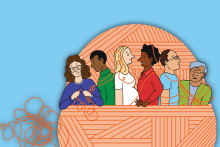
STUDY AFTER STUDY and book after book tells you that modern society has a community-support problem. People are lonelier and more isolated than ever and are expected to solve these collective and societal problems by themselves. But you don’t have to do this alone. You can do this with the support of my handy guide to community building!
Allow me to propose some ideas for how to create your own community-support network when every thread in the fabric of American society seems designed to keep you from it.
□ Search relevant terms on Google such as: “What is community?” and “What is community support?” Start a discussion group to answer these questions. Congratulations! You now have a community of people who love to argue in circles. Consider turning this into a Bible study.

I AM ABOUT to begin my Jesus Year. Which is to say, I’m one month away from turning 33, the age that many scholars believe Jesus was when he expelled demons, performed miracles, overturned tables and norms, and lived so counter to the expectations of empire that he was crucified for it, therein saving humanity with a radical act of peace and love.
Now, I don’t plan on doing all that. It’s already been done! But I love that Christians have transformed a random age into something significant. Most of the monumental birthdays of youth are behind me: I can already drive (16), I can vote (18), I can drink (21), I can rent a car without paying a surcharge (25), and I can get injured anytime I go for a jog without stretching (32). But 33 is even more special. While I don’t plan on dying, resurrecting, restoring, and ascending, I do have a few goals for my Jesus Year.

AS A JOURNALIST trained never to bury the lede, there is a snake in my house. It’s a distressing creature that slithers away into parts unknown when you try to capture it. The presence of this snake is deeply disturbing. Yet no matter how close I come to grabbing it — even with Grill Pro’s extended-length barbecue tongs (18 inches is as close as I’m going to get) — it always gets away, only to appear again in a different location.
It’s my fault, of course. Years ago, I allowed the creature into my house as a show of support for a granddaughter to whom all life is sacred. The Supreme Court also believes that all life is sacred, depending on which state you live in. But even if I took the reptile across state lines, I’d have to catch it first (with the above barbecue tongs), which I haven’t.
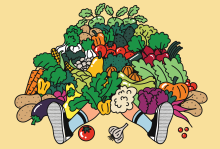
THE VEGETABLES ARE trying to kill me. I am drowning in vegetables. I clock out of my home office, and there are the vegetables. I take weekend trips, come home, and there are the vegetables. I can’t sleep, because deep in the corners of my mind, the vegetables are there — slowly rotting, mocking me, blaming me for their inevitable demise.
This is not a horror movie. This is a CSA subscription.
Short for “community-supported agriculture,” CSAs provide subscribers a selection of farm-fresh seasonal produce every week. They are a sustainable and often cost-effective way to eat local and give back to your community. They are also a terrific way to spend hours chopping vegetables and Googling “kohlrabi.”
In the pre-pandemic years, I, a black-and-white-moral-thinking-trying-to-do-right no-matter-the-cost twentysomething, signed up for a CSA every spring. Rarely have I experienced more anxiety, more rage, and more helplessness than when faced with a brand-new “single-sized” (but still enormous) bag of produce while most of the previous week’s veggies remained untouched and rapidly softening. Yet I, ever the Good Consumer, stressed myself silly over produce season after season, because what choice did I have? I couldn’t destroy the planet.
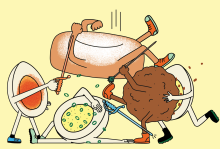
I MISSED SEVERAL church services growing up, but I rarely missed quarterly potluck Sundays. As Jesus modeled through his ministry and miracles, free food is an essential motivator. But alas, not all free food is created equal. So here is my definitive ranking of church potluck staples — the good, the bad, and the divisive. Because this is a Christian ranking, we’ll go in ascending order: The first shall be last.
7. Lemon Sugar Water
Don’t trust an aluminum container labeled “lemonade,” especially if it’s beside the dispenser of “coffee,” aka “coffee-flavored water” (I said what I said). The deacons thought two packets of Country Time Lemonade mix could multiply for the masses, but it is a diluted miracle, at best.
6. Stone Soup
I loved the parable the first time Pastor Jerry shared it during the children’s sermon: A stranger comes to town with an empty pot, throws in some stones, and stirs it with such prolonged passion that neighbors begin showing up, adding carrots, potatoes, and more until the soup is big enough to feed the whole town. A good lesson on how to trick strangers into being hospitable. But you can’t keep bringing a vat of stones to the potluck, Jerry. It’s a choking hazard, and the rocks look suspiciously like our parking lot gravel.

A WILL IS an important document that protects your family and ensures financial security for children who have yet to pay back the 300 grand you spent on each of them growing up. You definitely should not wait until you’re 73 to write one. In my case, I was waiting for the wisdom that comes with age. Failing that, I was also waiting for the lawyer we chose to grow up and go to law school. Because, when we first met him, I thought he was a teenager.
It’s like when I go to the doctor these days and she looks like she’s just been dropped off at soccer practice by her mom. Nothing like the white-haired doctor who used to frighten me with dire predictions of the health problems that every aging man confronts. But now that all those predictions have come true for me, I need to make my will.
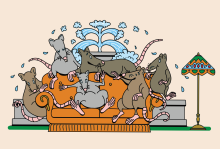
WHEN I MOVED to Washington, D.C., the second thing I noticed was the rats. (The first was that D.C. drivers are more aggressive than those from Indiana. I’ve since learned to use my horn liberally.)
I’m not proud of my initial response to these furry children of God. I shrieked. I complained. I was frightened to go outside at night, because with every step I took, I heard them scurrying. I could practically feel their long, pink tails tickling my ankles. I filled their burrows with dirt and rocks, covering them with bricks. I was proud of my resourcefulness, until I found the bricks shoved aside and the burrows reestablished. These rats were strong and resilient. Touché, rats. Touché.
As winter approached, the rat population shrank. Small communities could still be found dwelling near dumpsters, and I realized that like me, the rats were just trying to survive. I began learning about the plight of the urban rat and became convicted that as Christians committed to social justice, we must open our hearts to Rattus norvegicus.
You might roll your eyes and ask, “Is a Christian response to rats really necessary?” I assure you, it is. We don’t bat an eye at squirrels (also rodents), yet we are universally disgusted by rats, which are, in case you’ve forgotten, also part of God’s creation. We are so possessive over our trash that we would rather kill the rats than let them enjoy our chicken bones. We must do better.
That’s why I’m launching NIBBLE (Nonviolent Interventions By Bible-Loving Evangelicals), a nonprofit focused on improving human-rat relations in accordance with the gospel. Here’s a preview of our five-step plan for building Beloved Community with neighborhood rats:

LAST WINTER I woke up to 24 text messages on the family chain, which could only mean that someone had died, or someone was pregnant, or the San Antonio Spurs had finally decided to end their rebuild and trade four first-round draft picks for star point guard Trae Young. But I was wrong. My 2-year-old nephew Sébastien had asked his first theological question. The question arrived, according to my sister, around 6 a.m., an ungodly time for existential matters.
“What is a soul, mama?” Séb asked her. My nephew had been running through the lyrics of “Frosty the Snowman,” wondering what it meant to have a “jolly, happy soul.”
I FaceTimed my sister to learn more. “How did you respond?” I don’t have any kids — yet — so her anecdote was equal parts thrilling and terrifying.

WE RECENTLY SPENT a couple hours with a salesman who was promoting the advantages of installing a passive solar system.
He had me at passive.
He also mentioned the federal incentives and tax breaks, but it was the promise of passivity that would have made me jump for joy, had I believed in that level of exertion.
Passive is right up my alley. I love anything that you can do from a seated position. My oven is self-cleaning, I wear no-iron shirts, my refrigerator defrosts itself, sometimes even while I’m in the same room, seated. Those unexpected dripping noises remind me it’s working hard even when I’m not, unless the day’s Wordle is frustratingly difficult.
Not to mention the satisfaction of having skilled workers around the house, role models in an honest day’s work by able-bodied — albeit excessively tattooed — men that are otherwise missing from my home.

YOU THOUGHT YOU were going to be selected for the trial of some of the fascists who staged an insurrection at the nation’s Capitol on Jan. 6, 2021. You went through jury selection and everything! But for some reason (maybe your use of the word “fascists”), they turned you down. What’s next?
Here’s what to expect when you’re expecting Jan. 6-jury-related grief:
1. Denial
C’mon. There’s no way. Why wouldn’t they want me? I am a morally upright and very impressive person who has all the right opinions and does all the right things. I am a good Christian who believes that God’s law is what matters most, and I will do the right and just thing even when it is against human law. I am the most law-abiding citizen of the United States re: God’s law. Which is totally relevant to what the judge is looking for. Totally.

WHEN THE CHEST PAINS started, I knew there was no time to lose. So, I followed the well-established protocols for this emergency.
First, I plugged in my cellphone to charge. A heart attack is a serious condition that could result in a lengthy hospital stay. You don’t want to be out of communication with people whose sympathies will help in your recovery.
Second, I showered and shaved. You should always look your best, but particularly on what could be the last day of your life. You don’t want some coroner’s assistant commenting on your poor hygiene, while next of kin sheepishly apologize: “He was usually very clean.”
To that end, choice of outfit was key. Business casual is an acceptable ensemble for almost any occasion, but at that moment I was wearing white socks. Changing over to black would be appropriate, but knee-length dress socks might take too long for emergency room nurses to cut away to harvest a vein. So, I stayed with my whites. This was not the time to put on airs.
I considered wearing an older shirt that I wouldn’t miss if it were ripped open for the resuscitation paddles but settled on a slightly newer long-sleeved one. Classic but not too showy, and the vertical striping will provide pleasing symmetry on a gurney.